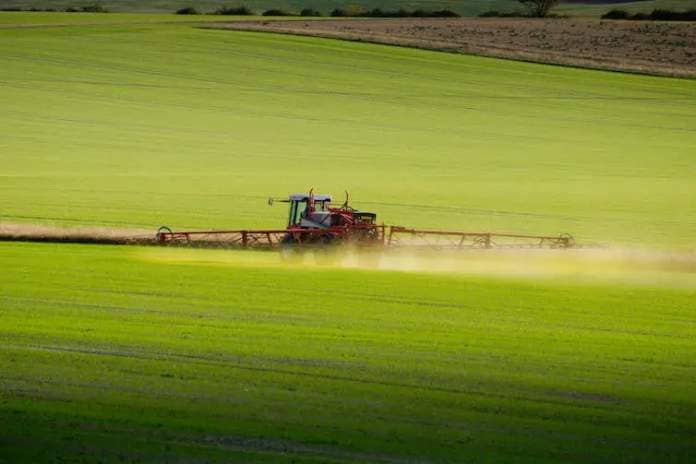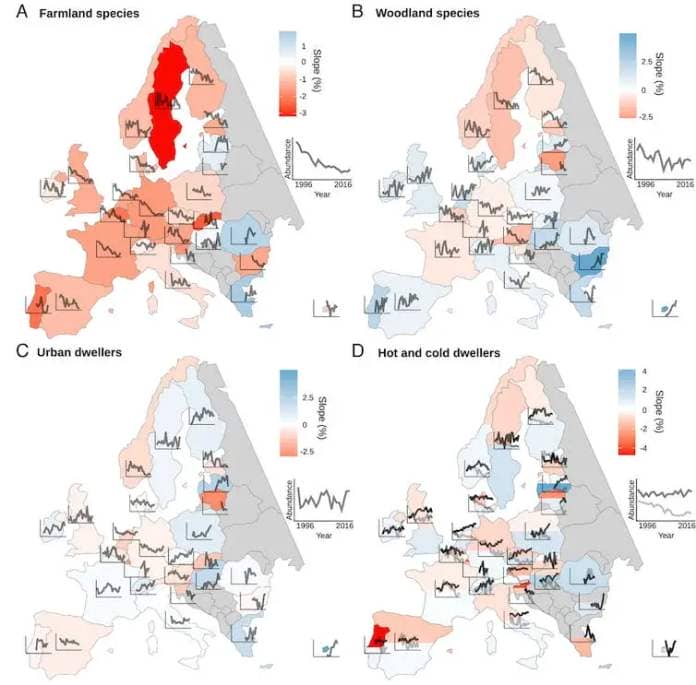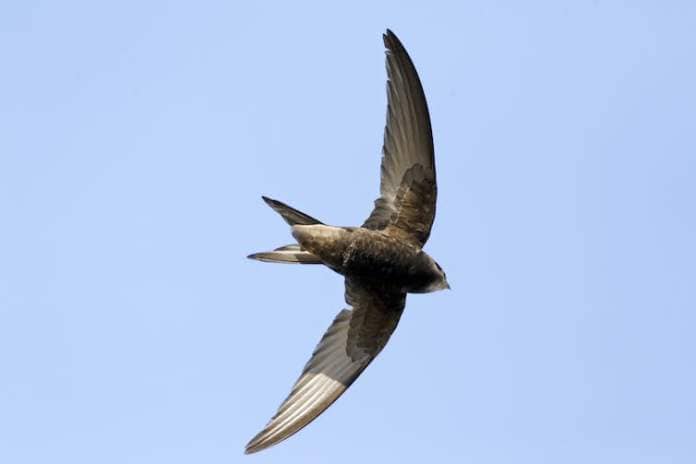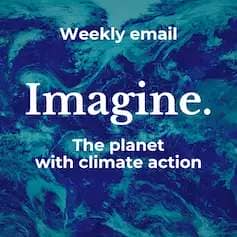A trickle of studies warning that the enormous variety of living things on Earth is diminishing has turned into a flood. The evidence for these losses within regions and globally is undeniable. But data on biodiversity, and what is causing its decline, is still patchy – restricted to some causes, some places and some species. That isn’t the case for birds in Europe, however.
Birds have long fascinated amateur and professional scientists, and close cooperation across Europe has created a deep body of knowledge about their habits, needs and numbers. Some of the longest-running datasets of their kind concern birds which live at least part of their lives in Europe.
This data paints a grim picture: an estimated 550 million birds have been lost from Europe’s total population over the last 40 years or so. It is a shocking statistic, and tells us something profound about humanity’s broken relationship with nature.
Scientists know that biodiversity is under increasing pressure, especially from rapid changes in how land is used (from forest to farmland, for instance) and rising temperatures. But how different species respond to those pressures, which of them is the most important, and how conservationists can respond to alleviate them, have all remained contentious issues.
Taking advantage of high-quality data on birds, a new paper I wrote with French researchers analysed how 170 bird species have responded to human-induced pressures in Europe, using data collected at more than 20,000 monitoring sites across 28 countries over 37 years, including data from the UK.
We found that chemicals used on farms to control insects and plants seen as weeds that might reduce crop yields are depriving many birds of their main food source, and that this is the single biggest cause of their decline across Europe.
The man-made drivers of change
We looked at four major sources of pressure on bird populations: agricultural intensification (measured by the high use of pesticides and fertilisers), climate change and its influence on temperatures, changes in forest cover, and urbanisation.

Charles Bowman/Shutterstock
Modern farming methods were the biggest cause of decline for most bird populations – especially for those that feed on insects and other invertebrates, such as swifts, yellow wagtails, spotted flycatchers, wheatears and stonechats. How birds responded to changes in forest cover, urbanisation and climate change was much more variable and species-specific.
Between 1980 and 2016, common birds in Europe declined in abundance by a quarter. But numbers of farmland birds more than halved during this period. There were also declines in both woodland birds and urban dwellers, in northern, cold-preferring birds, and even in some southern, warm-preferring bird species – though the overall trend in this latter group of birds is one of steady growth.

Rigal et al. (2023)/PNAS, Author provided
One of the study’s main findings is that the large use of pesticides and fertilisers on farms in particular is the most significant driver of bird population declines across Europe, including the UK. This does not come as a great surprise – many studies have come to this conclusion. But this is the first study to look at the man-made drivers in one go, using some of the best data available and modern statistical methods. The results are clear.
Agricultural practices began to change significantly after the second world war, as countries introduced measures to increase the output of farms. Yet such efforts to increase output, including an increasing reliance on pesticides and fertilisers, have come at a significant cost to birds and other wildlife – and critically, the overall health of the environment.
A recent UK government report found that the loss of biodiversity, alongside climate change, presented the greatest medium- to long-term threat to domestic food production. Biodiversity loss has consequences for society far beyond endangered species.
We believe that birds are mainly affected by pesticides and fertilisers through the loss of food, though these chemicals may be directly affecting their health too. Pesticides are designed to kill the insects and invertebrates that birds eat. Fertilisers change what kind of plants grow in an environment, often to the detriment of a wide variety of species. Invertebrates need this vegetation for food and shelter, and birds need it too – as well as the invertebrates.
Invertebrates are an important part of the diet of many bird species, but they are rocket fuel for growing chicks, which are the engine of population growth. Invertebrates are particularly important during the breeding period for over 80% of the birds in our study. The dramatic loss of insects we often hear about appears to be having a profound impact on birds.

Erni/Shutterstock
Nature-friendly food
The question is how best to respond. Nature is in trouble on farmland, and yet farmers can be a big part of the solution if they are supported by the right policies.
We need much greater support for nature-friendly farming practices, and a shift away from farming dominated by pesticides and inorganic fertilisers. This would be good for nature, for farmers and food production, for the climate, for consumers – and many progressive farmers are leading the way.
Our results also show the power of citizen science and cooperation across borders to advance science and better understand the natural world – and how to turn things around.
Now we need governments across the world to support land management schemes that reward nature-friendly farming, such as committing to managing at least 10% of farmland for nature, which in turn will help sustain or even boost farm yields.
But we also need wider food system reform, including nature-friendly diets. Retailers, suppliers and processors can all play their part to ensure a healthy environment that can feed us and bring back nature – with all the benefits for people this will bring.

Don’t have time to read about climate change as much as you’d like?
Get a weekly roundup in your inbox instead. Every Wednesday, The Conversation’s environment editor writes Imagine, a short email that goes a little deeper into just one climate issue. Join the 20,000+ readers who’ve subscribed so far.


